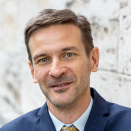Devising a Joint Forward-Looking EU Agenda in 2019
Despite the strong economic ties of the Visegrád Group (V4) to its EU partners in general and to Germany in particular, much more is required to cement future cooperation between the two sides, according to Ambassador Sibylle Sorg, Deputy Head of the Europe Directorate, Special Envoy for Negotiations on the EU Multiannual Financial Framework (MFF). “The single market and other economic issues are indispensable for each country’s European policies, but they alone are not enough to bring the EU forward”, she said at a half-day conference on the V4’s cooperation with Germany, which was hosted by the Robert Bosch Center for Central and Eastern Europe, Russia, and Central Asia at the German Council on Foreign Relations (DGAP) and attended by experts from the Czech Republic, Slovakia and Germany on 19 November 2018.
Poland, the Czech Republic, Slovakia, and Hungary have a total trade volume of over 250 billion euros with Germany, collectively making them the latter’s largest economic partner – ahead of China and the United States. “This relationship presents an opportunity to strengthen EU cohesion and integration following Brexit next March”, said Milan Nič, Senior Fellow at the Robert Bosch Center.
Given these economic links, the discussants debated how the V4 and the rest of the EU could jointly address current risks in transatlantic trade as well as its potential implications on the security interests of the respective countries. In Europe, fears are growing that Washington could impose car quotas or entice foreign carmakers to produce more automotive parts in America. Such measures could have far-reaching impacts not only on Germany, but also on Visegrád economies.
As Márton Ugrósdy, Director of the Budapest-based Institute of Foreign Affairs and Trade (IFAT) pointed out, Hungary is particularly wary of potential US penal tariffs, since the United States is Hungary’s largest non-EU trade partner and investor. The departure of the United Kingdom as another crucial trade partner could further compound Hungary’s economic drawbacks.
The panel found that taking a step beyond economic cooperation would be key for greater cohesion in the face of the existing challenges. These include the fragmentation within the EU which becomes manifest in the conflict between French President Emmanuel Macron and Hungarian Prime Minister Viktor Orbán, who have been presenting diametrically opposed views on the EU in their respective campaigns in the run-up of the European Parliament elections in May 2019.
Deepening cooperation among the V4 countries could advance a more cohesive Europe, former ambassador Volker Stanzel, Vice-President of DGAP indicated. “Although the integration of the V4 countries in the EU is a work in progress, it is a big achievement that these countries have become a solid group of self-confident and knowledgeable sovereign countries in Central and Eastern Europe, who support each other”, he added.
Indeed, cooperation in Central and Eastern Europe is not a given, said Jiří Schneider, Executive Director of Aspen Institute Central Europe and former Deputy Foreign Minister of the Czech Republic. According to Schneider, the Visegrád Group offers a valuable platform for cooperation not only among the governments for the regions, but also among the civil societies.
A close cooperation is all the more important given the recent rift in the V4/EU relationship over major issues such as migration and controversies over democracy and the rule of law in some V4 countries, Milan Nič said. The European Council agreement on a more consensual approach to migration in June 2018 could provide Berlin with an opportunity to re-shape relations with the V4.
In order to strengthen the cohesion of EU-27 after Brexit, the special relationship between Germany and France was central, Ambassador Sorg noted. But this did not mean that the Visegrád countries would be excluded from the process, he said. On the contrary, “the regular exchange with France and an intensive, parallel dialogue with the V4 countries are two sides of the same coin”, Sorg explained. “We do have our differences, but we are focusing on working on common topics and interests, both bilaterally with the individual countries and V4 as a multilateral format”. Sorg remarked that a “New Ostpolitik” as announced by the German Foreign Minister Heiko Maas, would only be feasible if it drew on the expertise of the EU’s eastern partners.

